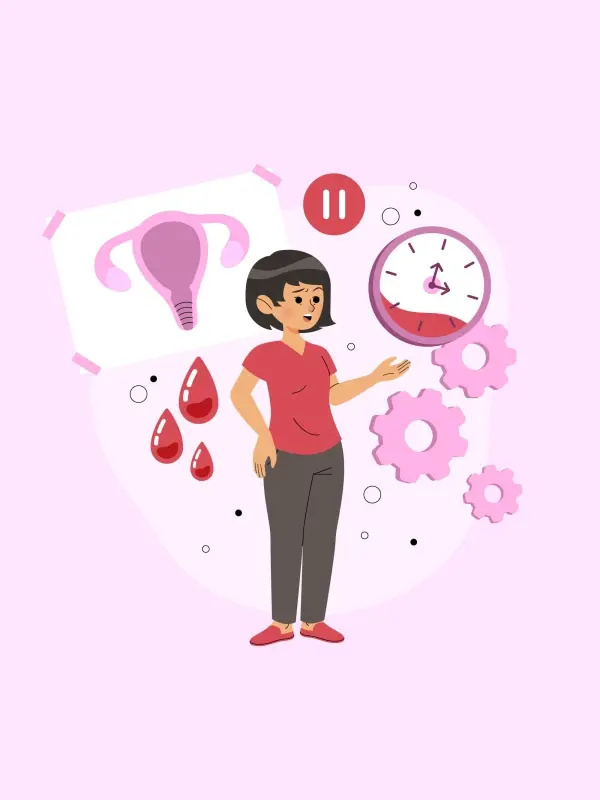TIrregular Periods Management in Women.
Can probiotics play a major role?

Menstrual cycle abnormalities can cause irregular or missing menstruation. The absence of a monthly period may not bother some women, but it is important to discuss any changes with a doctor because they may indicate serious health problems. If a woman goes more than three months without having her period, that's cause for concern.
Amenorrhea is the medical term for the lack of menstrual cycles or irregular periods, and it can be categorised as either:
- Primary Amenorrhea in which menstrual periods have not started by age 15 years.
- Secondary Amenorrhea where menstrual periods are absent for more than three to six months in a woman of any age who previously had periods.
Infrequent menstruation is medically referred to as oligomenorrhea in which women experience fewer than six to eight periods a year1 .
You may be experiencing period irregularity if:
- The time intervals between the period are beginning to shift.
- Blood loss may be higher or lower than average.
- Your menstruation cycle could linger anywhere from a few days to a few weeks.
Cause of Irregular Periods 1,2:
There are numerous possible causes of cyclical menstrual disruption. If your oestrogen and progesterone levels fluctuate, it may throw off your menstrual cycle. That's why it's so prevalent for preteen girls and women nearing menopause to have menstrual irregularity.
Additional typical reasons for menstrual irregularity include:
- Use of Intrauterine devices (IUD)
- Altering your prescription regimen or switching birth control tablets
- Exerting oneself excessively
- A disorder characterised by the development of cysts in the ovaries i.e Polycystic ovary syndrome (PCOS)
- Breastfeeding or pregnancy
- Stress
- Hyperthyroidism (overactive) and hypothyroidism (underactive)
- Uterine lining thickening or polyps
- Fibroids of the uterus
- Asherman syndrome, which is brought on by significant scarring (adhesions) of the uterine lining, is a less prevalent aetiology.
Management for irregular periodss3:
- Birth control: After three months of using a hormonal method of birth control, if your periods are still irregular, your doctor may suggest switching to a different method. Nexplanon, Depo-Provera, and IUDs can cause irregular periods.
- Lifestyle changes: Overexercising can affect a woman's period. Reduce your workout intensity or frequency. If stress is the issue, learning how to control it and talking to a counsellor may help. Extreme weight fluctuations can alter periods. Weight loss can improve ovulation. However, rapid weight loss can cause irregular periods.
- Hormonal Replacement Therapy (HT): Hormonal imbalances can cause irregular menstrual cycles. Oral contraceptives with oestrogen and progesterone are routinely prescribed for irregular periods. Progestin can help non-menstruating women have periods.
- Surgery: Scarring in the uterus or fallopian tubes can cause irregular menstruation. If you want children, your doctor may prescribe surgery to fix structural issues or birth defects. It can remove severe reproductive tract scar tissue.
Can probiotic help with irregular periods 4-6:
An imbalanced microbiota can create hormonal abnormalities, and too much oestrogen can cause stomach concerns including cramping and fluid retention.
Liver stores oestrogen after your ovaries release it into your bloodstream. The oestrogen is inactivated there and then transported to the microbe-filled colon. Then, it is metabolised by an enzyme before being excreted. The oestrogen will, however, flow back through your body and may result in a hormonal imbalance if that microbiome isn't functioning properly (stress related, a high-sugar diet, specific autoimmune diseases, or other circumstances). Therefore, if oestrogen recirculates in your body and you produce high amounts of it, you will likely suffer symptoms comparable to PMS, including heavier periods, bloating, and mood changes. Estrogen levels slowly rise and circulate throughout the body, creating menstruation issues.
Lactobacillus is an essential component of any effective probiotic for women's reproductive health. Specifically, it has been demonstrated to normalise the estrous cycle, in addition to promoting a healthy gut microbiota. Because of this, oestrogen levels are more likely to remain stable.
- Contributors, W. E. Why Is My Period So Random? Why Irregular Periods Happen. WebMD Learn more.
- What Are Irregular Periods: Treatment, Pregnancy, and More. EverydayHealth.com / Learn more.
- Patient education: Absent or irregular periods (Beyond the Basics) - UpToDate. Learn more.
- Connection Between Probiotic & Women’s Health - Read Now. Learn more.
- Meyers, J. Can Probiotics Affect Your Period? Jessica Meyers Learn more (2021).
- How Your Gut Health Affects Your Period — Periods and Probiotics. Learn more.

